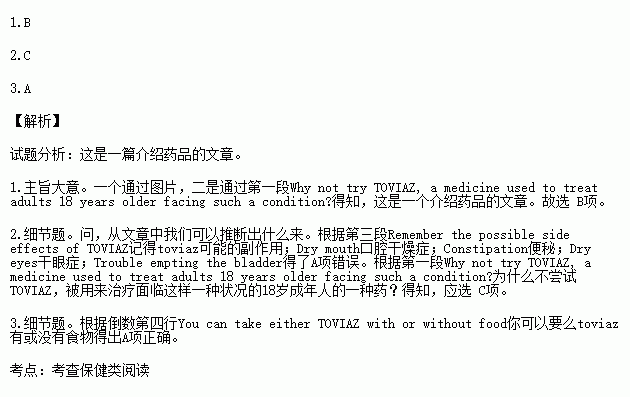题目内容
Are you still troubled by a disease called overactive bladder(膀胱)? Why not try TOVIAZ, a medicine used to treat adults 18 years older facing such a condition?
You are strongly advised not to take TOVIZ if you have following symptoms:
★ Your stomach empties slowly.
★ You are suffering from eye problems.
★ You’re allergic to any ingredients of TOVIAZ.
Remember the possible side effects of TOVIAZ
★ Dry mouth.
★ Constipation(便秘)
★ Dry eyes.
★ Trouble empting the bladder
Remember to ask your doctor for a complete list, since these aren’t all possible side effects of TOVIAZ.
More Detailed Instructions to take TOVIAZ:
★ Your doctor may give you the lower 4mg dose of TOVIAZ if you have severe kidney problem.
★ Take TOVIAZ with liquid and swallow the tablet whole. Do not chew, divide or crush the tablet.
★ You can take either TOVIAZ with or without food.
★ If you miss a dose of TOVIAZ, start taking it again the next day.
★ Decreased sweating and severe heat illness can occur when TOVIAZ is used in hot environments.
★ Drinking alcohol while taking TOVIAZ may cause increased sleepiness.

1.What is the main purpose of the passage?
A. To present a discovery on a scientific research.
B. To give information about a kind of medicine.
C. To teach patients ways of recovery from illness.
D. To show the importance of taking proper medicine.
2.What can be inferred from the passage?
A. There are only four possible side effects of TOVIAZ.
B. Don’t take TOVIAZ if you are allergic to its ingredient.
C. It’s unwise for people under 18 years old to use TOVIAZ
D. You may feel excited while eating TOVIAZ with alcohol.
3.Which of the statements about taking TOVIAZ is TRUE?
A. It’s OK to take it with food or without food.
B. Chew the tablet well before you swallow it.
C. Use TOVIAZ in hot environment to cure heat illness.
D. If you miss a dose, do take it right away on the same day.

